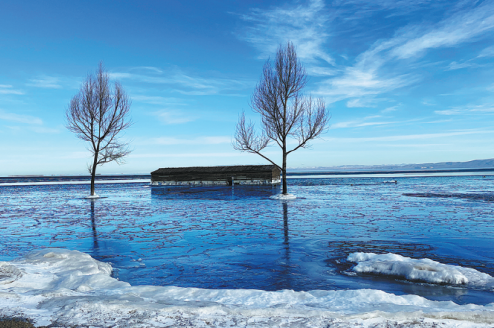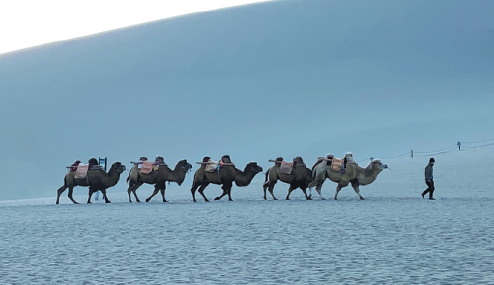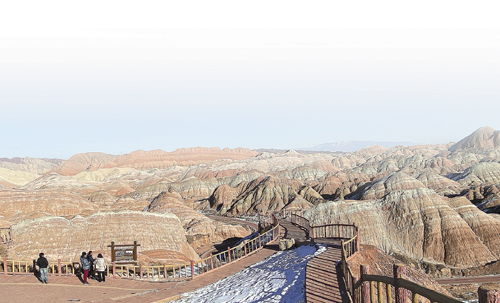Force of nature
Even the barren landscapes of Gansu and Qinghai in the middle of winter can help you reconnect with the power of life, Chen Meiling reports.
A desert may seem desolate, but walking on the dunes of Echoing-Sand Mountain on the edge of the Gobi Desert on a blustery and cold winter's day, I felt the strong power of life.
The first time I saw the desert, located in the city of Dunhuang in Northwest China's Gansu province, I was shocked. Born in central China, I'm familiar with rivers, forests, lush mountains and idyllic scenery. But I saw none of those during my seven-day travel in late December to Qinghai and Gansu provinces. All I saw were sand, grottoes and barren landforms, which in wintertime appear colorless and desolate.
But that was just the first impression. I soon came to see that the unfamiliar landscape has its own breathtaking beauty.
At Echoing-Sand Mountain, the sand itself sings a song of Gaia, as if it's chanting an epic poem recalling all the millennia that have passed with the shifting grains of sand. At bottom of the mountain, withered reeds sway as they await the thawing embrace of spring, as if patted to sleep under the cold hand of winter.
A camel caravan, ready to rest, makes its way across the sand mountain led by a middle-aged man, while the sunset creates a semicircular halo as a backdrop. The scene makes me want to press my palms together in prayer.
Before I put a foot on the sand, some local residents tried to persuade me to change my travel plan, saying that "it's not a good idea to visit these places in winter".They cautioned that the temperature can drop to as low as -20 C. The waters of Qinghai Lake are frozen, and the oasis would be bare of greenery. Daylight begins at around 9 am and night falls at around 6:30 pm. Most tourism-related entertainment and transportation services are suspended for the winter. Locals do the minimum of outdoor activities.
But I had made up my mind to go, as I had not traveled for almost a year due to the COVID-19 pandemic. I wanted to refresh myself by pressing the pause button on my usual life in Beijing. And I was right to make the trip, as far from being disappointed, as people said I would be, I was wonderfully surprised. By avoiding the crowds that are usually encountered at popular tourist sites in the warmer months, I was better able to appreciate the scenery and take as many photos as I liked at my leisure. I also didn't have to book everything in advance and, of course, I saved money.
It cost me about 4,400 yuan ($679) in total for the tour. All hotel rooms, four-star level and above, were about 200 yuan cheaper. All the scenic spots I visited offered deep discounts on entrance-ticket prices to drive winter business.
Although it caused some inconvenience that government-organized tourist buses were suspended, enthusiastic travelers can always find a way to solve the problem. For example, I paid only 113 yuan to join a one-day tour through on-demand service platform Meituan Dianping to visit Qinghai Lake and Qarhan Salt Lake in Qinghai (entry tickets and lunch not included).
The Qinghai Lake scenic spot, the largest inland lake in China, is about a two-and-a-half-hour drive away from Qinghai's capital, Xining, and is about 3,200 meters above sea level. Eight tourists, all traveling alone, gathered at 6 am, excited to be the only tourists visiting.
Partly frozen, the lake was like a broken blue mirror. The trees and wooden houses standing on the center of the lake, together with the snow-covered banks, gave it the appearance of an oil painting. Birds scattered in all directions when we disturbed them. Wavelets lapped on the stones along the banks, leaving icy traces. In some areas, it was hard to tell whether it was just ice or land.
Ma Qingfei, 24, a tourist in the group, wrote in a WeChat Moment that: "It's a pure land to refresh one's heart entangled by noisy city life. The harmonious scene left a long-lasting aftertaste."
Jiang Huiling, 23, who had traveled from Guangdong province, says she had never seen real snow before. She thought the trip was well worth it.
Before entering Qarhan Salt Lake to the west of Qinghai Lake, which is about a four-and-a-half-hour drive from Xining, we saw a train transporting salt out. Our driver and guide said the salt would end up on people's dinner tables after it's processed.
We didn't see any water of the lake until we had walked 5 kilometers to the center of the site. My head and ears ached because of the cold and my hands were frozen the moment they were exposed to the air. Most of the walk, I felt like I was pedaling in a washing machine. Nonetheless, I joined the others in taking some good selfies, forcing a smile.
It is not unusual for strangers to develop a camaraderie when exposed to a harsh environment together. It's the friendship of comrades.
Because it was the off season, I got to charter a car for 160 yuan to tour the Danxia landforms scenic spot in Zhangye of Gansu, and 320 yuan for the Jade Gate Pass and Mogao Grottoes in Dunhuang, Gansu. I can tell the drivers were very pleased to get a charter client in the winter months.
It was something of a luxury to be able to view the Danxia landforms for more than five hours. The landforms were dramatic-the sides facing the sun displayed their characteristic white, yellow, orange and red stripes, while those facing away were covered in snow. Sunset is the perfect time to see the sandstone glow. We traveled among the four observation decks by taking a bus. It's forbidden to step on any part of the landform, as it may take 600 years for it to recover.
The Jade Gate Pass, the gate for traders and envoys to travel to Western countries, functioned as a key port along the Silk Road and a major military fortress during the Han Dynasty (206 BC-AD 220). Now, only few ruins remain. I imagined the vast expanse of the Gobi Desert as it must have looked to others who stood there long before me. The barren and deserted landscape, together with solemn background music broadcast through a loudspeaker, made me feel like a soldier who guarded the border and hadn't returned home for 30 years.
I thought of a sentence I had read online about loneliness being a state of mind. And I realized that the hospitality of nature meant although I was traveling on my own, I didn't feel alone. Maybe it's not necessary to be in a crowd to be part of social life. Talking to the ancestors by revisiting the places where they lived, even though they may appear bleak and desolate, is another way to link the minds of "old friends".
Contact the writer at chenmeiling@chinadaily.com.cn

















